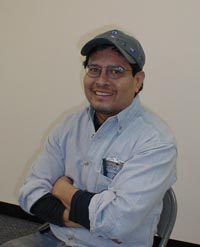|
|

|
|

|
Richard, "Chico", Perales.
Click to enlarge.
|

|
|
|
|

|
|
Meet
Chico:
Richard
Perales
|

|
Welding
Foreman and Purveyor of Daily Wisdom
by Paul Doherty
January
3, 2002
Richard
"Chico" Perales is more than Foreman of the welders
and insulators at McMurdo Station. He's a source of much-read
daily wisdom and Antarctic humor. When I walked into the plumbing
shop to get some PVC pipe for an experiment, Richard stood
up, stuck out his hand, smiled, and said, "Hi, I'm Chico,
can I help you?" Chico has a lifetime of experiences
down here. We ended up talking for quite a while, and it was
clear that his most important experiences on The Ice involve
people. Here's some of what he told me.
Paul:
How long have you been coming to The Ice?
Chico: I've been coming here for 10 years, I wintered over
4 or 5 times. I won't winter over again since I feel I've
done it all.
P:
Are you a welder? What do welders here do?
C:
I am not a welder. I manage people. I give respect to their
knowledge of welding. We have guys that are really talented
and they don't have big egos. For example, one guy does all
the TIG [tungsten inert gas] welding. The welding shop guys
build experiments for the beakers [scientists]. The first
time they come to us, they bring detailed drawings. My guys
are so experienced that they make lots of suggestions on how
to improve the design. The second time they come to us, they
bring a drawing on a napkin. After that, they just come and
talk to us. We recently had to build a volcanic-bomb-resistant
housing for a camera on the rim of Erebus.
P:
What's it like in the winter?
C: It's cold. You can't get precisely what you need, so you
make do with what you've got. You turn into McGyver. We keep
pulling rabbits out of the hat, but we're afraid that we'll
run out of rabbits. I keep a diary, in July of my first winter
I wrote, "get me the hell out of here!" As a foreman you have
to know how people change in the winter: In July they are
homesick, tired, and cold. So you have to make allowances.
P:
How is it working with scientists?
C: The beakers are characters. They are passionate, they work
hard, and do it with a smile, mostly. You have to learn to
translate their language: When they say they need something
done in a week, they really need it in two days. When they
say they need it in two days, they need it yesterday. When
they really need stuff, we bend over backwards. I like the
science part. We talk to the PI [principal investigator] We
pick their brains, find out what they are doing and why. When
we go to the sea ice camps they give us the red carpet treatment
and thank us for the work.
P:
You do the comic strip for the "Antarctic Sun."
Where do you get your ideas?
C:
I was inspired by Calvin and Hobbes. There is humor all around
us all the time. Recently a notice appeared on the Rec [recreation]
board "Swim with the Antarctic Cod." There are places in New
Zealand that let you swim with the dolphins, this sounds like
the Antarctic equivalent. Except, the cod swim in 28-degree
water and have sharp teeth. Some fingies [new guys] actually
signed up.
P:
What have you got out of your Antarctic experience?
C:
The program has been good to me. When I go home, people tell
me what they've done for the entire year in ten minutes. I
can't even begin to tell them all the things I've done. We
have exotic travel, science lectures. I visited Big Bend National
Park, and it was nothing compared to what I've seen on my
travels. It's all relative. I think an astronaut returning
from Mars wouldn't even notice the Dry Valleys. My #1 experience
of my whole life was crossing the Drake Passage on the way
to winter over at Palmer Station. It was the boat ride from
Hell.
Chico
does a regular cartoon, "The Ross Island Chronicles,"
for the "Antarctic Sun."
You
can see his cartoons here
. In addition, he sends a daily
email to the McMurdo gang called "Spanish Word of the
Day." He describes it as "quite simply a gibberish
email about a whole lot of nonsense," but we call it
a great window into life here. Not to mention that it can
help increase your Spanish vocabulary. Here are a few examples:
No
tenemos las velas mas luzes en el postre.
"We don't have the brightest candles on the cake."
Mejor
un burro vivo que un leon muerto.
"Better a live donkey than a dead lion."
La
gente desgraciada de necesidad necesita gente que sera bien
para ellos y
la gente prospico necesita gente para hacer bueno."
"The unfortunate need people who will be kind to them
and the prosperous
need people to be kind to."
Deritado.
"Melting."
|

